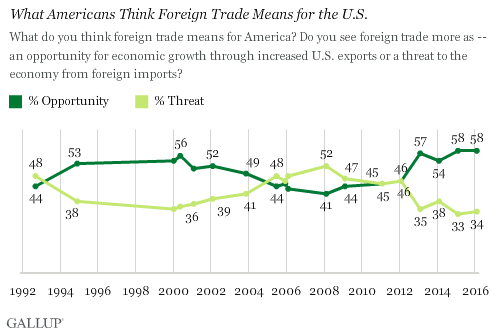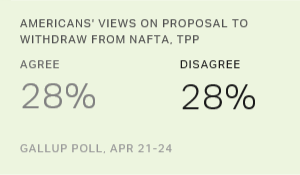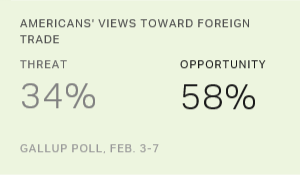Story Highlights
- 28% of Americans favor U.S. withdrawal from free trade treaties
- The same percentage are opposed, with 43% having no opinion
- Half favor stricter import duties on Chinese goods
PRINCETON, N.J. -- More than four in 10 Americans say they don't know enough to say whether the U.S. should end its participation in free trade deals such as the North American Free Trade Agreement (NAFTA) and the Trans-Pacific Partnership (TPP). Among Americans who do have an opinion, 28% favor withdrawing from trade treaties, and the same percentage oppose it.
| Agree% | Disagree% | Don't know enough to say% | |||||||||||||||||||||||||||||||||||||||||||||||||||||||||||||||||||||||||||||||||||||||||||||||||
|---|---|---|---|---|---|---|---|---|---|---|---|---|---|---|---|---|---|---|---|---|---|---|---|---|---|---|---|---|---|---|---|---|---|---|---|---|---|---|---|---|---|---|---|---|---|---|---|---|---|---|---|---|---|---|---|---|---|---|---|---|---|---|---|---|---|---|---|---|---|---|---|---|---|---|---|---|---|---|---|---|---|---|---|---|---|---|---|---|---|---|---|---|---|---|---|---|---|---|---|
| Apr 21-24, 2016 | 28 | 28 | 43 | ||||||||||||||||||||||||||||||||||||||||||||||||||||||||||||||||||||||||||||||||||||||||||||||||
| Gallup U.S. Daily | |||||||||||||||||||||||||||||||||||||||||||||||||||||||||||||||||||||||||||||||||||||||||||||||||||
Gallup measured this proposal as part of a series of tests of how Americans react to ideas that presidential candidates have enunciated this year. Several candidates -- particularly Donald Trump and Bernie Sanders -- have campaigned on ending these trade agreements. The 28% agreement ranks this issue near the bottom of the list of more than 50 proposals tested, partly reflecting the higher percentage who don't have an opinion, but also a result of the split opinion.
Trump believes that trade agreements have been poorly negotiated, saying the TPP is "one of the worst trade deals" and "I would rather not have it," and calling NAFTA a "total disaster." Sanders has railed against NAFTA and the TPP, arguing that these have a severely negative effect on the U.S. job market. Sanders says the TPP "must be defeated" and that NAFTA "has led to the loss of nearly 700,000 jobs."
Last fall, Gallup measured reaction to the proposed idea in a different form, asking Americans how effective withdrawing from the free trade treaties would be in improving the U.S. economy. Sixteen percent of Americans in the Sept. 23-27 survey said that removing the U.S. from "the 12-country free trade agreement known as the Trans-Pacific Partnership" would be very effective in improving the economy. Eighteen percent said the same about ending U.S. participation in free trade deals "such as the North American Free Trade Agreement, or NAFTA, or the Central America Free Trade Agreement, or CAFTA." The scores placed these proposals near the bottom of the list of a large number of economic proposals tested, rank-ordered based on perceived effectiveness.
These questions on the trade pacts provide information on how Americans react to the basic idea of the U.S. getting out of the trade treaties, based on how the candidates might phrase the proposal on the campaign trail or in interviews.
A long-standing Gallup trend question provides broader context to Americans' opinions on trade. The question contrasts the idea that free trade agreements provide more of an economic opportunity because of exports, with the idea that free trade constitutes an economic threat because of imports.

Americans' responses have varied since the question was first asked in the early 1990s. But over the past four years, a majority of Americans have consistently viewed trade as an economic opportunity rather than a threat -- including 58% to 34% in February of this year. Thus, while many Americans don't have an opinion on the issue of withdrawing from specific trade agreements (and those with an opinion are split), they are positive on the overall concept of free trade as an economic plus rather than as a negative.
That more than four in 10 Americans say they don't know enough about the free trade pacts to have an opinion suggests that the public's opinions are rather weakly held, and that Americans may not be highly conversant with the details of specific trade deals. As a result, poll questions that mention that allowing more imports might cost jobs produce higher levels of support.
A separate policy proposal that Gallup tested in March asked Americans about the idea of imposing "higher import taxes on Chinese products coming into the U.S." Fifty percent of Americans agreed, 22% disagreed, and 27% said they didn't know enough to have an opinion. This question didn't remind respondents that products might cost more if they are subject to increased import duties, or that there might have to be a quid pro quo increase in tariffs on exported goods if this were to take place. But the results highlight that public support for specific trade-related policies can be greater than agreement with the broad idea of trade as a threat, or support for withdrawing completely from free trade treaties.
Implications
Trade policies, like most issues, may be highly important to highly specific segments of the population. As such, candidates' positions on trade could affect the presidential election outcome in certain states or areas within states. Recent academic research, for example, has shown that Americans living in areas disproportionately affected by trade competition are more likely than others to either vote more strongly left or more strongly right, suggesting that trade policies can, in fact, affect political behavior. Candidates also may find it useful to bring up trade as a campaign issue because it gives them a specific "enemy" to blame for economic woes and provides an easy explanation for the loss of manufacturing jobs.
But, trade is not top-of-mind to Americans when they are asked to name the most important problem facing the country or the most important priorities for the next president. Less than 1% mention trade in response to either of these open-ended questions, although trade may be a factor driving the concerns that are verbalized -- the economy and jobs in particular.
More generally, Americans continue to say that trade is more of an economic opportunity than a threat to the nation. And, while many don't have a position on the proposal to withdraw U.S. participation from free trade treaties, those who do are split, and there is little indication that the public believes such actions would be highly effective in improving the U.S. economy.
Historical data are available in Gallup Analytics.
Survey Methods
Results for this Gallup poll are based on telephone interviews conducted April 21-24, 2016, on the Gallup U.S. Daily survey, with a random sample of 551 adults, aged 18 and older, living in all 50 U.S. states and the District of Columbia. For results based on the total sample of national adults, the margin of sampling error is ±5 percentage points at the 95% confidence level. All reported margins of sampling error include computed design effects for weighting.
Each sample of national adults includes a minimum quota of 60% cellphone respondents and 40% landline respondents, with additional minimum quotas by time zone within region. Landline and cellular telephone numbers are selected using random-digit-dial methods.


